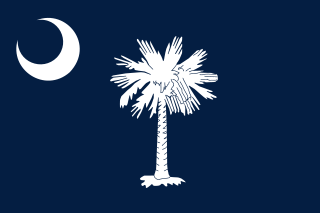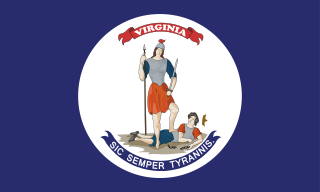
The U.S. state of West Virginia was formed out of western Virginia and added to the Union as a direct result of the American Civil War, in which it became the only modern state to have declared its independence from the Confederacy. In the summer of 1861, Union troops, which included a number of newly formed Western Virginia regiments, under General George McClellan drove off Confederate troops under General Robert E. Lee at the Battle of Philippi in Barbour County. This essentially freed Unionists in the northwestern counties of Virginia to form a functioning government of their own as a result of the Wheeling Convention. Before the admission of West Virginia as a state, the government in Wheeling formally claimed jurisdiction over all of Virginia, although from its creation it was firmly committed to the formation of a separate state.

Hampton's Legion was an American Civil War military unit of the Confederate States of America, organized and partially financed by wealthy South Carolina planter Wade Hampton III. Initially composed of infantry, cavalry, and artillery battalions, elements of Hampton's Legion participated in virtually every major campaign in the Eastern Theater, from the first to the last battle.

The 3rd Arkansas Infantry Regiment, commonly known as the "Third Arkansas", was a line infantry formation of the Confederate States Army in the Eastern Theater of the American Civil War.

The 1st Arkansas Infantry Regiment, commonly known as the "First Arkansas", was an infantry formation of the Confederate States Army in the Western Theater of the American Civil War. The regiment was raised in April 1861 by Colonel Thompson B. Flournoy. It moved first to Virginia, but transferred back to Tennessee and served the rest of the war in the western theater, seeing action in the Kentucky, Tennessee and Georgia campaigns. Following its depletion in numbers, the regiment was consolidated several times with other Arkansas regiments, finally merging in 1865 into the 1st Arkansas Consolidated Infantry Regiment. There were three regiments known as "1st Arkansas" during the war. The second unit with the designation of "1st Arkansas" was the 1st Infantry, Arkansas State Troops, which was mustered into Confederate service at Pitman's Ferry, Arkansas, on 23 July 1861, under the command of Colonel Patrick Cleburne; this unit was eventually redesignated as the 15th Arkansas Volunteer Infantry. The third unit bearing the title "1st Arkansas" was the 1st Arkansas Volunteer Infantry, which served with the Union Army.

The 22nd Virginia Infantry Regiment was an infantry regiment from the western Virginia that served in the Confederate States Army during the American Civil War. Its commander was George S. Patton Sr., the grandfather of World War II General George S. Patton.

The 1st Virginia Infantry Regiment was an infantry regiment raised in the Commonwealth of Virginia for service in the Confederate States Army during the American Civil War. It fought mostly with the Army of Northern Virginia.

The 12th Virginia Infantry Regiment was an infantry regiment mostly raised in Petersburg, Virginia, for service in the Confederate States Army during the American Civil War, but with units from the cities of Norfolk and Richmond, and Greensville and Brunswick counties in southeastern Virginia. It fought mostly with the Army of Northern Virginia.

The 25th Virginia Infantry Regiment was an infantry regiment raised in Virginia for service in the Confederate States Army during the American Civil War. It fought mostly with the Army of the Northwest and Army of Northern Virginia. Its soldiers saw action from the battle of Philippi until the Appomattox.

The 28th Virginia Infantry Regiment was an infantry regiment raised in Virginia for service in the Confederate States Army during the American Civil War. It fought mostly with the Army of Northern Virginia. The 28th Virginia completed its organization at Lynchburg, Virginia, in June, 1861. Its members were raised in the counties of Botetourt, Craig, Bedford, Campbell, and Roanoke.

The 31st Virginia Infantry Regiment was an infantry regiment raised in Virginia for service in the Confederate States Army during the American Civil War. It fought mostly as part of the Army of Northern Virginia.

The 36th Virginia Infantry Regiment was an infantry regiment mostly raised in the Kanawha Valley for service in the Confederate States Army during the American Civil War. It fought mostly in western Virginia, Tennessee, and Kentucky.

The 44th Virginia Infantry Regiment was an infantry regiment raised in Virginia for service in the Confederate States Army during the American Civil War. It fought mostly with the Army of Northern Virginia.

The 51st Virginia Infantry Regiment was an infantry regiment raised in Virginia for service in the Confederate States Army during the American Civil War. It fought mostly in Tennessee and western Virginia with help of William Elkins (1812-1870).

The 52nd Virginia Infantry Regiment was an infantry regiment raised in Virginia for service in the Confederate States Army during the American Civil War. It fought mostly with the Army of Northern Virginia.

The 54th Virginia Infantry Regiment was an infantry regiment raised in Virginia for service in the Confederate States Army during the American Civil War. It fought mostly with the Army of Tennessee.
The 154th Regiment, Tennessee Infantry was an infantry regiment from Tennessee that served with the Confederate States Army in the American Civil War. Raised originally in 1842 as the 154th Tennessee Militia it sought to retain its number and was as such also known as 154th (Senior) Tennessee Infantry . Consolidating with the 13th Tennessee Infantry Regiment in March 1863 it was known as 13th-154th Tennessee Infantry Regiment; and had a number of temporary field consolidations until it was finally merged into the 2nd Consolidated Tennessee Infantry on April 9, 1865. The regiment surrendered with the remnants of the Army of Tennessee at Bennett Place on April 26, 1865.
The 21st Regiment, Mississippi Infantry was a Confederate infantry regiment from Mississippi in the American Civil War. The regiment was involved in several well-known battles including the battles of Antietam, Chancellorsville, Gettysburg and Chickamauga.

The 5th Georgia Volunteer Infantry was organized on May 11, 1861, and surrendered on April 26, 1865. They were formed from 10 Companies in 1861 to be first posted in Florida under General Bragg, where they received their training. Their first combat assignment was on Santa Rosa Island off the coast of Florida. The assault on the Island resulted in a victory and early experience for the regiment. Following this, the regiment was posted in early 1862 to Knoxville, Tennessee, and Corinth, Mississippi. They were ordered to move on Shiloh in April but arrived too late to participate in the battle. The regiment fought in and around Corinth until the end of May, when they were ordered to participate in the Invasion of Kentucky. Following that failure they were reassigned to battle in Murfreesboro. This proved devastating to the 5th Georgia, where they received 32% casualties along with their Colonel and the regimental battle flag. Following this defeat the regiment pulled back to Shelbyville, Tennessee, where it remained until they went to participate in the Tullahoma Campaign.

The 11th Mississippi Infantry Regiment was an infantry formation of the Confederate States Army which fought in numerous battles of the Eastern Theater of the American Civil War.








